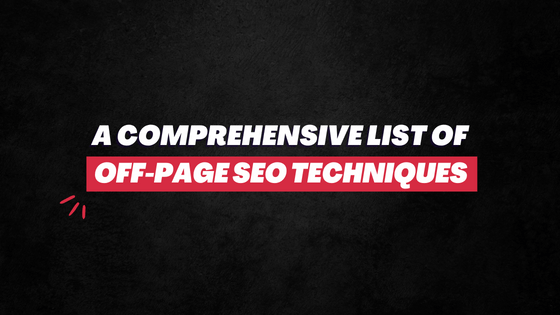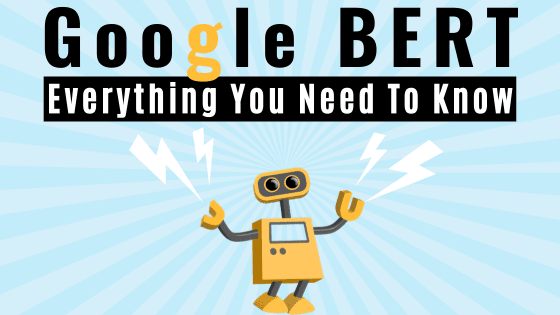
When I Google “need visa in India of USA”, which basically means I want a visa in India to travel to the USA (the intent is: How do I get my visa for the USA in India) – here’s what Google’s snippet result says…
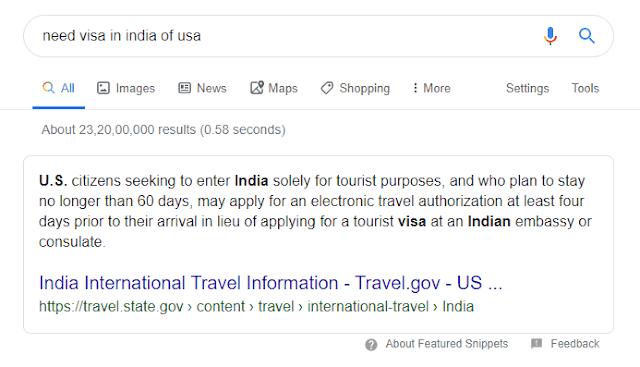
The snippet shows how an American can get a visa to enter India.
It’s completely opposite of what I actually asked. It’s wrong.
Google BERT update promises to solve such problems and make the result much more accurate.
What is Google BERT Update?
Google has called this update “one of the biggest leaps forward in the history of Search”. And it certainly is one of the biggest algorithm updates since 2015’s RankBrain.
BERT stands for Bidirectional Encoder Representations from Transformers.
Don’t let this complex full-form make you believe it’s for the software engineers and data scientists.
Technically, BERT is a neural network-based technique that facilitates natural language processing (NLP) pre-training.
It is open-source, meaning anyone can use this technology to train their own question-answering system.
- BERT helps Google see all the words in a sentence at the same time – instead of looking at words one-by-one in order.
- BERT uses transformer architecture which allows Google to analyze individual words in context to other words in the search query.
- BERT analyzes search queries that may have some words randomly masked out or skipped. It then predicts those hidden words to determine the intent of the search query before showing the results.
- BERT helps Google predict what a user will type or say next. While autocomplete has been there for a while now, BERT assures to make it more accurate.
In Simple Words…
BERT is a change in the algorithm that would help Google better understand natural language processing.
It will help the search engine better understand the context of your search queries to deliver you the results that accurately fit your needs and requirements.
It will decipher the true meaning and intent of what exactly you’re searching/asking for.
So, if you think Google is accurate already – it’s going to get a lot better.
The algorithm update will particularly affect the longer, conversational queries where prepositions like “for” and “to” are important in making true sense of the sentence.
Such natural language queries have always been difficult for Google for understand – but not anymore
Google BERT affects both ranking and featured snippets.
And since it’s affecting featured snippets, it will also affect your voice result; since your voice search results usually retrieve information from these featured snippets.
Per Google, BERT will affect 1 in 10 search queries in the USA in English. It is already in use to improve featured snippets in about 24 different languages.
In the coming days, these numbers will only increase, affecting a significant number of Google and voice results.
So, even if it’s not affecting you right now, it eventually will as your traffic grows.
How BERT Affect Search Results: Examples
To explain what BERT is, Google gave a handful of examples.
In the query “2019 Brazil traveler to USA need a visa” – ‘to’ is very important that defines the intent of the query. It’s about traveling from Brazil to the USA. It’s looking for information around the visa.
Here’s how search result looked before and after BERT:
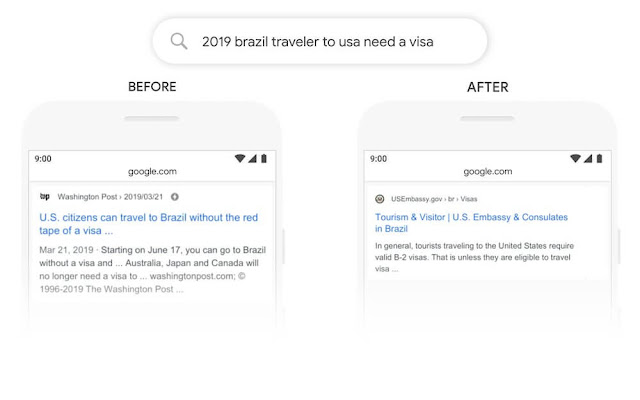
Another query: “do estheticians stand a lot at work”. Here’s how the result looked before and after BERT:

Need more examples?
Query “can you get medicine for someone pharmacy”. Here’s how it looked before and after BERT update:
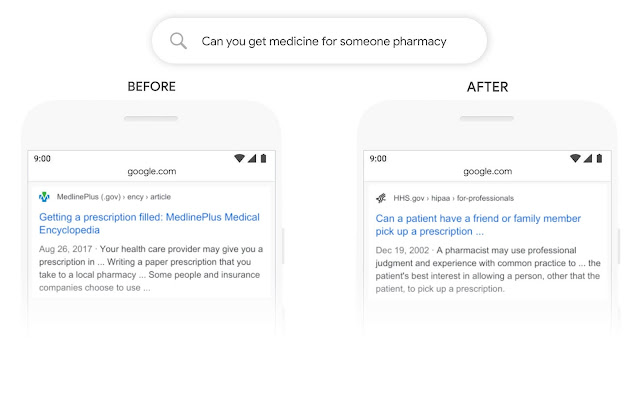
Here’s how BERT affects search snippets:
Query “parking on a hill with no curb”
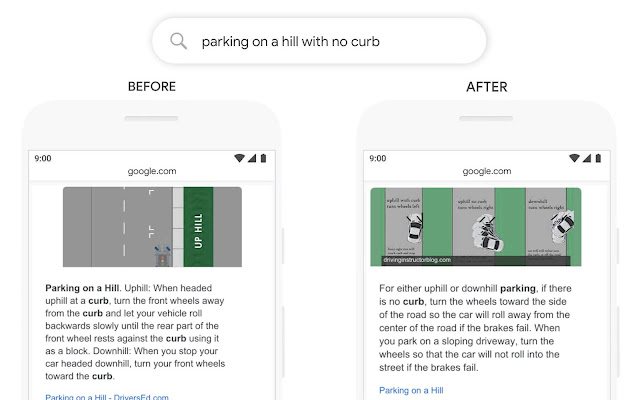
Earlier, Google focused more on ‘Curb’ and ignored ‘no’. Evidently ‘no’ here is very critical to the meaning of this query. After BERT, it now undertakes ‘no’ in understanding what the user really means.
How to Optimize for Google BERT?
An honest answer is…
I DON’T KNOW.
Nobody really knows. And if someone is telling you otherwise, they are lying.
Here’s what Danny Sullivan, Google’s search liaison, said:
There’s nothing to optimize for with BERT, nor anything for anyone to be rethinking. The fundamentals of us seeking to reward great content remain unchanged.— Danny Sullivan (@dannysullivan) October 28, 2019
So, in other words, you cannot optimize the site for BERT, except for continuing to create “great content”.
But, of course, as is with any Google algorithm update, there isn’t any shortage of guess works even here.
Remember, the primary objective of BERT is to deliver more relevant results for natural language search queries.
So, in that context, there are a handful of things you can change in your SEO strategy to stay ahead in the game.
Here are five things you should do:
1. Focus on the long-tail keywords
It’s an old news, I know.
You would have focused on long-tail keywords despite Google BERT. But it’s worth mentioning.
As is explained above, BERT will largely affect the long-tail, conversational queries.
Moreover, if you look at the examples given by Google as to how BERT affects the results, the queries are all long-tail.
So, focus more on long-tail, question-based keywords.
But that said, this doesn’t mean you overlook generic and medium-tail keywords.
The key is to avoid keyword stuffing. So, as long as it makes sense and sounds good, you should use your primary and LSI keywords, irrespective of their length and numbers.
Recommended Read: How To Do Keyword Research for Free in 11 Minutes?
2. Stop caring about exact-match keywords
There are still people who force exact-match keywords in their sentences no matter how awkward it sounds.
But with BERT in action now, you wouldn’t need to do that.
Owing to the bi-directional contextual models, Google can now understand the intent of search queries even with prepositions and filler words.
For example, it can understand “top clothing manufacturer USA” and “top clothing manufacturer in the USA” are the same.
So, avoid using exact-match keywords now.
They make the sentences sound awkward and senseless, which might influence user experience negatively.
3. Create highly specific content
People now want accurate answers much faster.
There’s a reason why you see so much of rich snippets on SERP these days. Because Google is trying to deliver on users’ new needs and preferences.
BERT fits in that mission perfectly well.
It helps Google understand the exact context of the search query. And when the search engine understands what the user is asking for, it will deliver a list of results that specifically addresses that need.
Meaning, it will deliver much more direct answers – or results that offer direct answers.
For example, you have written an in-depth article on “An Ultimate Guide on the Best Weight Loss Diets” – where you have included all forms of diets, including Paleo, HCG, Vegan, and Ultra-Low-Fat.
On the other hand, one of your competitors has created a piece on “A Guide on Paleo Diet”.
Now, when someone searches for “What is Paleo Diet” – your competitor is more likely to rank higher for it, even when you have covered the same question in your article.
Because your competitor’s article addresses that query much more specifically.
Let’s take another example:
Say someone searched for “what is content marketing”.
Now, articles that directly and specifically answer this question are much more likely to rank higher than something like “An Ultimate Guide on Content Marketing” – even when the latter one does answer the query.
Makes sense?
Perfect!
So, you must now create highly specific content that addresses queries much directly without unnecessarily covering too many other related topics that the user hasn’t asked for.
Recommended Read: How to Create Content Fast (Without Hurting its Quality)
4. About the length of the content
The experts have long rallied behind and advised to create long-form content to rank better.
Personally, I have always maintained that the length of the content should only be as much as it’s needed – whether it’s 300 words or 9,000 words.
Google has never used the length of the content to recognize its quality, value, and relevance.
Now, following BERT update, since you need to create more specific content, the room to create long-form content unnecessarily gets further smaller.
So, if you have been creating never-ending pieces of content because someone told you that longer version is preferred by search engines – you might want to stop.
Stop focusing on the length of the articles.
Focus on their uniqueness, relevancy to the primary keywords you’re targeting, and the solution they deliver.
Make sure the reason why users have clicked on your result, they get their solution.
Recommended Read:
5. Give answers – engaging and valuable answers
As said already, BERT will largely affect the long-tail, conversational queries. And as voice searches grow to be popular, the number of such queries will get higher.
Now, if you think intuitively, most of these conversational queries are usually question-based.
This means, at large, you should focus on delivering answers to the users.
And not just any answer – but answers that are unique, engaging and have a solid value proposition.
Avoid writing generic posts, opinionated articles and vanilla content that doesn’t address a definite question of your target audience.
Your blog posts must answer individual questions.
Conclusion
Not a lot is known about Google BERT update except…
- It’s a giant leap forward for search engines in understanding natural language
- You should continue producing high-quality content.
We don’t know how it’s going to affect the search rankings. We don’t know what changes one can make in their SEO strategies.
We’ll likely find the answers as months go by and there’s enough data to outline the impact of BERT on search ranking.
Until then, aside from all that is mentioned above, the golden advice we all have is plain and simple…
Create content for humans and not search engines.
Vague advice? YES.
But effective advice? Hell yes!
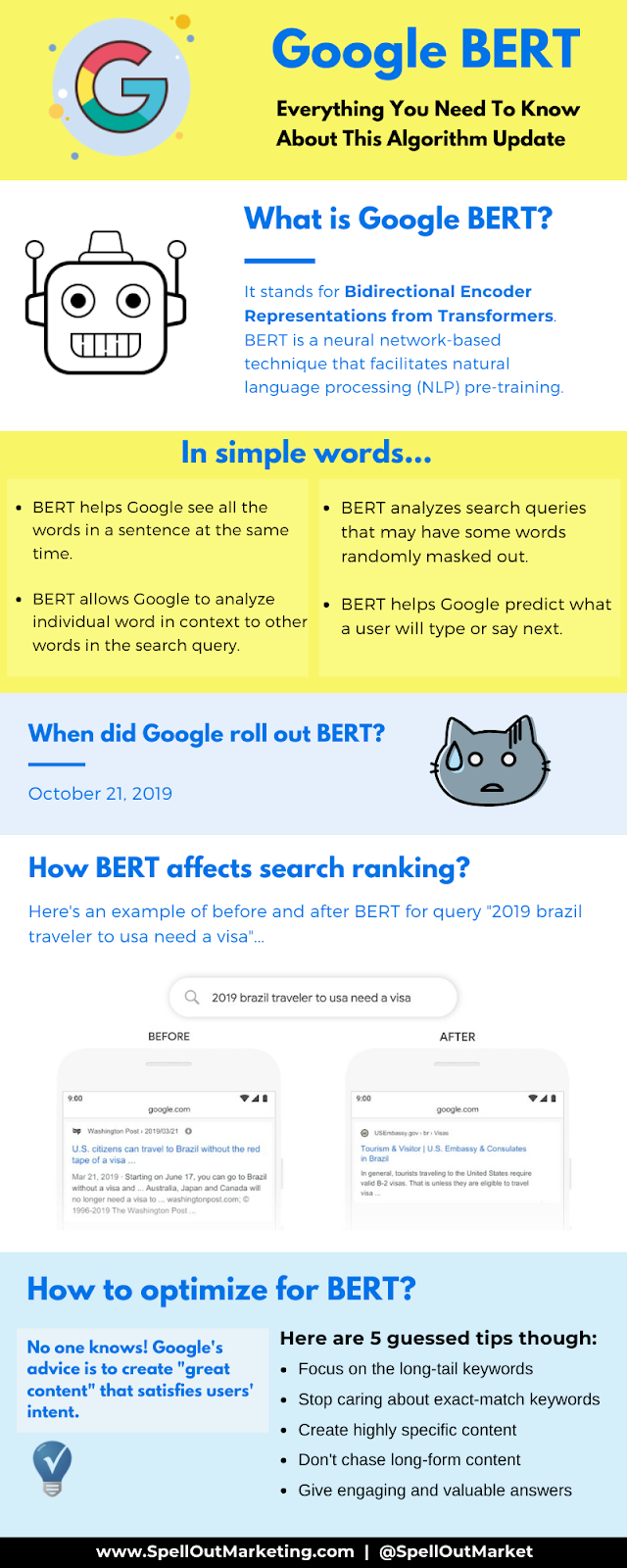
Found this post helpful? Please share it on your favorite social platform! 🙂
Recommended Read: Google Ranking Dropped After Algorithm Update? Here’s What To Do


